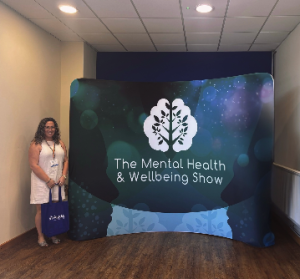The Cardiff Mental Health and Wellbeing networking event, held during Mental Health Awareness Week, served as a meaningful platform for dialogue, collaboration, and knowledge-sharing among organisations dedicated to improving mental health across Wales. This event provided invaluable insights into the services and resources available for individuals in need of mental health support.
A member of our team, Rhian Bumford (Solicitor) and an accredited mental health panel members, represented CJCH Solicitors at this impactful gathering. Her involvement not only reinforced our firm’s commitment to advocating for mental health awareness but also strengthened our position as a trusted legal partner in mental health law.
Key Takeaways from the Cardiff Mental Health and Wellbeing Event
A Platform for Collaboration
Networking events like this one foster collaboration among organisations driven by the shared goal of improving mental health outcomes. Rhian engaged with organisations such as Mind Cymru, ACS Cymru, and Achieve Together. These discussions expanded our understanding of the broad spectrum of support services available within the community, from in-hospital care to community-based support.
The event served as a reminder of how essential it is for legal professionals, charities, and healthcare providers to work in unison. By fostering these collaborations, we can deliver a more holistic and effective approach to mental health support.
Insights into Mental Health Resources
One of the event’s most valuable aspects was the opportunity to deepen our awareness of the resources available for individuals in Cardiff and the wider Wales region. This knowledge is particularly relevant to our practice as it enables us to guide our clients more effectively, ensuring they are aware of and have access to community resources that complement the legal support we provide.
Understanding the broader context in which legal cases take place is a critical part of our approach to mental health law. Whether it’s securing Section 117 aftercare services or advising nearest relatives on their rights, knowledge of available support networks enhances our ability to advocate for our clients comprehensively.
The Importance of Mental Health Awareness Week
Mental Health Awareness Week provides an important moment for reflection and action. It draws attention to the issues surrounding mental health and fosters conversations that can lead to meaningful change. Attending the Cardiff event during this week underscored the importance of ongoing efforts to reduce stigma, promote understanding, and drive systemic improvements in mental health care.
At CJCH Solicitors, we recognise the critical role that awareness campaigns play in shaping public perceptions and improving outcomes. Events like these inspire us to carry on our work as advocates for mental health rights.
Forging Connections with Local Charities
Building relationships with local organisations is central to our work in mental health law. Through discussions at the networking event, we laid the groundwork for partnerships that could enhance the services we provide to our clients. By connecting with like-minded organisations, we aim to create a web of support that ensures no individual feels isolated or unsupported during challenging times.
How Networking Supports Our Mission
Enhancing Expertise
Full comprehension of Cardiff’s and Wales’ mental health network strengthens our expertise in legal matters. Our ability to effectively represent our clients in tribunal cases, provide advice on detention under the Mental Health Act, or secure Section 117 aftercare is significantly enhanced by an understanding of the broader support ecosystem.
Reinforcing Our Dedication to Advocacy
By attending events like these, we reaffirm our commitment to mental health advocacy. We believe in the power of collaboration to not only improve outcomes for our clients but also to contribute to long-term improvements in mental health care.
Expanding Knowledge to Better Serve Clients
Networking is an essential tool for expanding our knowledge base. Understanding the needs of the community and the resources available allows us to offer bespoke, tailored advice to each client. From explaining complex legal terms in plain language to guiding clients through what may be an intimidating legal process, we strive to offer support that is both compassionate and effective.
Join the Conversation
Mental health should be at the forefront of public discourse, and we believe in the power of collective effort to make a difference. Whether you’re an individual seeking support or a professional interested in collaboration, here’s how you can join us in this mission today:
- Speak to Our Team: Do you need advice or representation regarding mental health law? Reach out to our experienced team to learn how we can assist you.
- Subscribe for Updates: Stay informed about mental health law, community initiatives, and upcoming events by subscribing to our newsletter.
- Share the Message: Help raise awareness by sharing this post within your network. Empower others by contributing to the conversation around mental health.
- Learn More About Us: Explore CJCH Solicitors’ commitment to mental health advocacy and how we combine legal expertise with compassionate support.
Working Together for Mental Health
The Cardiff Mental Health and Wellbeing networking event was not just an opportunity to engage with forward-thinking organisations but also a chance to reflect on the importance of collaboration in addressing mental health challenges. This event reinforces our belief that by working together, legal professionals, charities, and healthcare providers can create meaningful change in our communities.
At CJCH Solicitors, we remain steadfast in our advocacy for those navigating the complexities of mental health law. With our expertise, compassionate approach, and commitment to building connections, we aim to support each client in achieving the best possible outcomes.
Join us in championing mental health rights. Reach out to discuss how we can assist you with your legal needs or connect with us to learn more about our role in the mental health community.






















